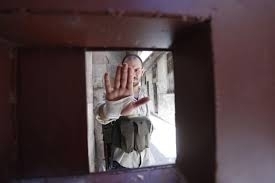It’s three in the afternoon on a February day in 2015. My mobile phone rings in my bag. It’s my mother calling.
“Where are you?”
“I’m in a taxi, coming home.”
“OK, please be careful. Mortar shells are falling thick and fast near the house. Watch out for yourself.”
“All right, I’ll be careful.”
But how is anyone living in Damascus these days supposed to be careful? Death lurks around every corner. It can come from the least expected places at the least expected times.
The taxi stopped about 100 meters away from my house. Our neighborhood is enclosed by concrete barricades, as is the case on so many Damascus streets. These barriers have become the hallmarks of a once open city, and have added to the burdens of life here.
After the dozens of bomb blasts that have rocked the capital since the end of 2011, landmarks and even travel routes changed. Checkpoints manned by the army and various security agencies spread across most neighbouhoods. Some estimates put the number of checkpoints inside Damascus and on its boundaries last year at 300.
Near military zones or important locations like the central bank and municipal buildings, whole streets were barricaded off with metal and cement blocks, most of them painted with the regime’s flag. These streets only reopened a few months ago.
It feels like my city has been this way since time immemorial. I often forget what it looked like four years ago, and how we used to move about freely even through the narrowest alleyways, how we used to feel as if we owned all its secrets and hidden places. It’s the same city today, and yet it is so strange, so hard, so dried-out that it’s painful.
And so, those last 100 meters to my home had to be crossed on foot. With every meter, I faced the unknown. Randomly fired mortar shells have become an almost-daily occurrence in Damascus, and nowhere is spared.
I don’t remember exactly when those shells started to fall on our heads – has it been two years or more? It doesn’t matter. All I know is that at first, I was terrified every time I heard the booming thud of a shell hitting the ground, and that the terror began to abate as the days passed, fading into a strange kind of indifference.
Where do those shells come from? We tried hard to analyze and determine the direction they came from and where they might fall. Yes, a lot came from the Free Syrian Army, the side I consider “friendly,” but a lot also came from the regime side, the “enemy” side.
Does the murderer’s identity really change anything? Death is death, but I have to say that death at the hands of a friend is a far more painful prospect than death at the hands of an enemy.
And so, those last 100 meters. As usually happens when I cross this space, thoughts crowded my mind. Which side of the street should I walk on? Is the left or the right side safer? Should I speed up, or is it better to walk slowly? My fate over those 100 meters is governed only by chance.
Where a shell might fall and how the shrapnel might scatter is impossible to predict. A single step more, a single step less can mean the difference between certain death and renewed life.
I remember my friend’s neighbor, who died when she was hit by shrapnel from a building opposite the room where she had been sitting. A piece lodged in her head and killed her instantly.
Would death have found her if she had been in another room? Or would her fate have followed her wherever she went, following the [Koranic] principle that “whatever God has written for one must come to pass?”
I carefully took note of the noise around me, trying to listen for the whistling sound that signalled the imminent descent of a mortar shell, as this might give me a split second to change my fate.
I wondered whether it would be better to lie flat on the ground or hide behind a tree or car if I heard that accursed whistling.
In my dreams, I often see myself standing in my room by the window, watching a shell shrieking its way toward me and exploding in my face like a shattering blow from a punch. I shake and sway, but I am not hurt.
In other dreams, I see shells fired into the air, flying into the sky and disappearing, never changing course to come down and hit the ground. And I wonder to myself why don’t people invent a shell that flies up into the air and then fades away? Why must a shell make contact with a surface and then explode? What if it never finds a surface? Would it just keep going on into nothingness?
I think of the traces left by mortar shells that now scar most streets in this city, small pits distinguished by the pattern of hundreds of shrapnel fragments around them.
I remember one that fell on a small kiosk selling newspapers, biscuits and sweets. The entire kiosk burnt down and the owner died, but the trace of the shell and its shrapnel are still there on the pavement and walls.
The 100 meters were over. I arrived home in the knowledge that on this day, I was lucky. Tomorrow or the day after, I might be unluckier. Damascus today is simply a city of chance.


